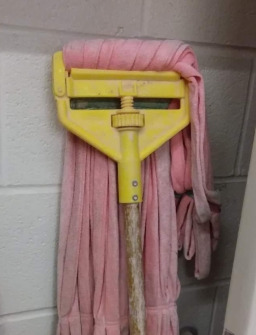
In a Dark, Cold Place
"That's hardly a child at all," one of the visitors said. "It's merely an animal. A creature. It hardly counts as human. I daresay, if we were to lead it outside, at the first touch of sunlight it would scream as if burned, and run back down to its proper home. It and its cellar were made for each other."
The visitor looked imperiously down the narrow wooden stairs, surveying the object of his pronouncements. "Just look at it," he said. "The door is wide open, but is it trying to escape? No. It knows where it belongs."
The malnourished, stunted child cringed away from the visitor and the light, with its hands half-covering its eyes. "Nuh-uh," it said. "Nuh-uh."
"You see?" the visitor said. "Do you call that human speech? Hardly."
Behind the visitor, a caretaker said, "You're upsetting it. Please do close the door and leave it alone. If you frighten the child too much, and it dies of the shock, we'll have to get another one."
"Hmmph!" the visitor said. "I don't think it CAN die, at least not yet. It's fated to live there in its miserable squalor, just as the fate of our entire city depends upon our having such a prisoner."
The visitor lifted a handkerchief over his nose. "I can't stand its stench." With a forceful thud, the door closed. Most people, had they been locked up with the child for a brief time, would have said the room was completely dark. The child's eyes saw barely more than anyone else would have, by the least traces of light that filtered down through a few small cracks above.
***
You might think a cellar of ten feet by six feet small enough. But for this child, the prison was smaller yet.
In the opposite corner of the cellar, several feet away from the child's accustomed resting spot, two tall things with strangely shaped heads stood leaning against the wall. When this child and the cellar were new to each other, the child had crawled restlessly, feeling the floor and the walls, seeking a way out.
The child had brushed up against a bucket, and something had fallen upon the child's head, a painful surprise attack from above. The child had jerked back, screaming. "I didn't mean to! I didn't mean to!"
A minute later the door opened, and the caretaker rushed down into the cellar. "See what you've done!" she shouted. "You've made a mess, and woken me up with your clatter and your howling!" She kicked the child, who retreated into a corner. The caretaker righted the bucket, and leaned the mops back against the wall, just as they had been before.
"Now don't you dare do that again, or you'll find out what it means for me to be truly angry!" She kicked the child several times, to emphasize her point. Finally she left the miserable creature to its weeping. She went back upstairs, locking the door behind her.
That had been years ago. After that misadventure and similar misadventures that came soon afterwards, the child's confused consciousness remembered one thing. The bucket and mops and their corner were a source of pain and terror. Only this corner of the cellar felt truly safe.
***
Sometimes, while sleeping, the child dreamed. Most often, the dreams were of the child's captivity.
Sometimes a dream was as dark and quiet and uneventful as the night would have been if the child were awake. Most nights, such dreams were the closest thing to peace the child knew.
Other times, the child dreamed of angry attacks from the caretaker, or from visitors, or even of the horrible things in the corner falling upon it again and again without mercy. The child woke from those dreams gasping and sobbing, but usually not screaming. Screams had too often caused the caretaker to tromp down the stairs and punish the child for disturbing the caretaker's own sleep. So the child had learned to suffer nightmares in silence.
Sometimes, but not very often, the child's dreams were infused by broken, fragmentary memories from before the basement. The child might dream of being in a soft-floored place with vertical bars, and of light that didn't hurt the eyes. Enormous people might look down at her and smile, and speak gentle words. A few dreams even took the child into a vast space that seemed to go farther than she could guess at. Strange sights that she had once called grass, and flowers, and trees. There was even an energetic, friendly creature called a dog, which chased smaller creatures but never seemed to catch them. The dog made loud noises, but somehow the child knew not to fear those.
One night, during such a dream, a larger creature walked towards the child. This creature was yellow with pink hair on its head.
"Hello," the creature said. "My name is Fluttershy."
"Name," the child repeated. "Name." The child would have said its own name, but it couldn't quite remember it.
"You seem like a nice little creature," the Fluttershy said. "I want us to be friends, if you wouldn't mind."
The Fluttershy reminded the child of the friendly dog, except for being even bigger, and talking! The child toddled towards the creature, pressing herself against it. The yellow fur felt good where it touched the child's face.
The Fluttershy giggled. "I guess you DO want to be friends. I'm so glad!" The yellow creature's face nuzzled the top of the child's head.
The child looked up with yearning. It wished it could be with Fluttershy forever, in this place where the light didn't hurt.
The child struggled to speak. It hadn't spoken in a very long time. "I love you," it said.
Fluttershy's breath played in the child's hair, which was short and clean. "I love you too."
"I want...be with you."
"I want you to be with me too. May I tell you a secret?"
"Yeh," the child said. "Yeh."
"Wherever an animal is in trouble, and suffering, I want to go help it, and make it feel better. I want to find a way to be with you, no matter how bad a place you're in."
The child woke up. The cellar was dark and cold and damp, but it didn't feel quite so lonely anymore.
That morning, when the door opened and the caretaker stomped down into the cellar carrying a small bowl of corn mush and a larger bowl of water, the child shielded its eyes from the glare.
The child made a soft animal snuffling, hungry for the mush. The caretaker set both containers down on the floor.
"You don't seem to talk much, anymore."
The child warily reached out for the small bowl, finally snatching it to lap up mush with a practiced tongue.
"Look at you, eating out of the bowl with your face in it. Just like an animal, you are. I reckon the people who call you that are right. Maybe you weren't born an animal, but you're becoming one, that's for sure."
The child licked hungrily. There was never really enough in the bowl, but if she ate as fast as she could, she could pretend for a few moments that she was allowed to lap up as much as she wanted.
Anyway, if she ate too slowly, someone might take it away from her before she was done. That had happened before, when she hadn't learned she should always eat as fast as she could.
"I reckon you've had enough. Give me the bowl."
The child looked up at the caretaker, and growled. A foot to her face made her drop the bowl, and cringe backwards against the wall. "Nuh. Nuh!"
"So you still can talk, kind of. But you haven't learned to obey." Another kick emphasized the point. The caretaker fixed the frightened child in place with a harsh glare while picking up the bowl. Upon standing, she kicked the child again.
While the caretaker backed slowly out of the room, the child's gaze flicked over into the corner.
In the corner was a tall yellow thing, with something like pink hair on top of it. It reminded the child of the Fluttershy.
The child was very confused. Was this the same as the thing that had attacked when the child was new to the cellar?
Or was this a different thing? Maybe this yellow and pink thing didn't mean any harm at all?
Maybe the attack had all been the bucket's fault.
The door closed, leaving the child once again in darkness.
***
The next time the child dreamed, she was in the big place again. She saw the Fluttershy. "Fluttershy! she shouted. "Fluttershy!"
The pink and yellow thing walked towards the child. "Yes, it's me. How are you?"
"A thing!" the child said. "A thing!"
Fluttershy nodded. Somehow she knew what the child meant. "In the corner? Yellow and pink, like me?"
"Yeh! Yeh!"
Fluttershy said, "Come and hug me!" The child toddled up against the welcoming creature, and pressed her face into the yellow fur. "I know," Fluttershy said. "Those mean people are very bad. I don't like them at all. But you know about the thing, right? What it is?"
"The thing!" the child agreed.
"Yes. Those people don't want you to go near the thing, because the thing loves you, and it keeps you company while you're in the bad place. But even if you can't go over to the thing, the thing is still watching over you and keeping you company. The thing loves you." Fluttershy's wings came down and embraced the child. "The thing loves you so much."
"Out!" the child said. "Out!"
Fluttershy nuzzled the child's head. "You want to get out of the bad place?"
"Yeh. Yeh!"
Fluttershy said softly, "I can only help animals, you know."
"Amal. Amal."
"Yes. Those people have tried to make you into an animal, haven't they? But what if they succeeded? I wonder if they know what might happen? Who might come to rescue you."
"Yeh. Yeh."
"Yes, that's right. Someday Fluttershy will come take you away, and you'll never have to go back there again."
***
After that night, the child was a little different, somehow. When the caretaker or the visitors talked to this child, it didn't speak even a "Nuh! Nuh!" or a "Yeh."
Instead, it whined, or growled. Once when it was being beaten especially strenuously, it screeched so loudly that the attacker put both hands over her ears and retreated up the stairs, locking the door behind it.
After that retreat, the child was left alone for even longer than usual. As the child's hunger and thirst grew, the subtle light filtering through the cracks above waxed and waned three times, hinting that three days had passed.
The third night was a very thirsty time. In desperation, the child stood, and followed the wall into the corner of fear and hurt. There the child felt what she was sure was the yellow and pink thing. Uncaring of the consequences, the child hugged the thing's top. It was soft.
On the fifth day, when the caretaker came down to check on the disobedient, beastlike child, the caretaker screamed.
***
"What do you mean, the child is missing?" a city official said.
"Just what I said. The door was locked, the walls and floor and ceiling are intact, but the child is gone!"
A tour group, come to fulfill their civic duty of learning about the child whose suffering ensured the city's prosperity and happiness, arrived at the worst possible time. "What do you mean, gone?" a serious-faced teenager asked. "Did you let her out?"
"She's not a HER!" the official insisted. "Call the child an IT. It's better that way."
"But you just called the child a HER yourself!" another teenager said. "What are you trying to hide?"
"Nothing. Nothing at all. I'm sure this little misunderstanding will all be cleared up shortly."
The visitors pushed their way past the official, and to the cellar door. Two teenagers ran down the stairs, and quickly ransacked the cellar's entire contents. It didn't take them long to move one bucket and three mops. As they might have expected from the caretaker's words, they found no child at all, not even a tiny one stunted by malnutrition.
The visitors reexited the cellar, while other teenagers from the group pushed the official and the caretaker back out of the way. "You know what this means," the serious-faced one said.
"Yes," said another, who quoted:
"Omelas cellar, dungeon dreary,
must always hold a prisoner child.
Innocent youth, starved and suff'ring,
No love given, turned animal wild.
Beat and kick, bruise and batter,
Convince the child it does not matter.
But actions and cruel words are lies.
Without that child, all Omelas dies."
One of the youths ran out of the house, shouting. "The Cellar Child is gone! Our doom is upon us! The day of Omelas' destruction has come! Everyone, get out of the city!"
The official grimaced. "Someone stop that boy. He's gone crazy. We'll find the Cellar Child and lock it up again, and everything will be fine. We'll just...call a general search."
One of the youths asked sadly, "And how will you tell everyone to search for the Cellar Child, without admitting that she's missing?"
"There you go using that SHE word again. It's an IT!" The official reached up and tugged at his collar. "All we have to do is search the town, and we're sure to find the child." His eyes darted towards the caretaker standing beside him. "And maybe the caretaker knows more about this disappearance than she lets on. I'm sure there are ways to make her reveal what she SAYS she doesn't know. And if she won't talk, or can't remember? We can put HER in the basement."
As the official reached to grab her, the caretaker bolted.
"Omelas is fallen! Omelas is fallen!" the caretaker screamed as she ran out into the city streets. "The Cellar Child has been taken from us! Everyone flee the city, before the doom takes us all!"
"Is that the Child's caretaker?"
"I believe it is. I'm sure of it. Caretaker, what's the matter? Is what you're saying true, or have you only gone mad?"
Panic and fear-fueled rage grew. Before the day was out, caretaker had become corpse, and all Omelas was burning.
***
In another world, in a cottage, a yellow pony with pink mane and tail hugged a small, strange creature. Hair growing on the creature's head had been cut short to remove tangles, and the filth of years' captivity had been washed from it. Sores on its buttocks and the backs of its thighs had been medicated and bandaged. Its eyes were closed tightly, against a sunbeam shining through a window.
The creature quivered in Fluttershy's lap. With one forehoof, the pony gently stroked the creature's back. "There, there. Everything will be ok."
"Nnng!" the creature grunted. "Nnngggh!"
"Don't worry. You're safe now."
The creature whined like a dog.
Someday, Fluttershy resolved, the creature would know that it was safe. It had known how to talk, once. Maybe someday, it would learn how to speak again.






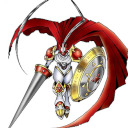
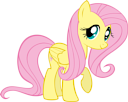

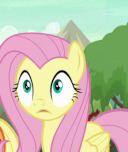


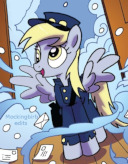

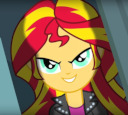


Ahaha- I see this fluttermop everywhere on Instagram
Wow. This was a very strange read! I enjoyed it tremendously.
Damn, that was dark. Reminds me of the movie Room.
The original story is rather short on mention of "Those who actually try to do something about Omelas" and "Those who want to burn Omelas to the ground."
11076505
Given how their society is described in the original story (based as it is on the tacit agreement between all citizens old enough to understand that their collective welfare and happiness depends entirely of upholding the child's suffering), I don't think attempting either of those two things would be conductive to an extended stay within Omelas (most likely, they eventually realize the futility of trying either and face a choice: either let it go or walk away).
Also, I couldn't help but notice that, by the end, the number of mops in the cellar has increased from two to three (kinda makes me wonder about the other mop: is it someone or somepony in particular? or just a regular old mop? Eh, given its lack of importance in the story, probably the latter...)
11077840
If your society depends on the suffering of a child, there is something wrong with your society. And if it is objectively true that society will collapse if there is any attempt to change the system, then the author is visibly putting their thumb on the scale.
(If there's any truth in the original story other than "societies are often built on cruelty and suffering, and their elites spend a lot of time trying to indoctrinate the population in believing there is no other option than the current setup", I'd like to hear it.)
11077886
Actually, Le Guin was inspired by this quote from Dostoyevsky's Brothers Karamazov:
and this similar one from William James (to which she gave credit, as she only vaguely remembered the one from Dostoyevsky):
In a way, her story is a subtle criticism of the widespread literary trope of apparent utopias that are inevitably coming with a catch in the form of some hidden necessary evil (such as the forsaken child, which only features once the narrator has done their laudatory description of Omelas and anticipated the skepticism of the reader, as if its actual purpose was to meet their expectations that such a perfect society simply cannot be).
An unexpected combination of pony meme and classic dystopia. You’d think the result would be a crappost, but you make it work in a way respectful of both Le Guin’s original work and Fluttershy’s character. Thank you for this.
11077886
I got the impression of a self-fulfilling prophecy. Omelas falls without its child because everyone believes it must. I suppose you can add “Never believe your own hype” to the lessons of the original.
11078098
But what exactly is the criticism, save perhaps a reductio ad absurdum by boiling down the whole issue of inherent oppression to one kid being treated badly? Does Le Guin believe a society that is prosperous and happy AND socially just is possible? She certainly seems to be saying that it's not something we're capable of imagining, at least not under current circumstances.
11085957
Theres the old SCP theory about the woman who's supposedly tortured every day without remorse to keep an eldritch entity from eating Earth- and how shes not actually being tortured, but so long as everyone thinks she is, the plan works all the same.
ah, the self-serving callousness, to convince oneself that the deprivation is for the best even for the victim
oof! love how this is, if anything, more callous than the visitor complaining about the child's smell
this is so very grim and saddening. i recognize the detached prose style from other works of yours, and it really works for this passage
something about a system that runs on fear and violence only meeting fearful and violent ends. well, reality is not always so sensible, but that is what allegorical stories are for!
ah, the tragedy! Fluttershy can speak to the animals, but the child is too broken to be within the reach of even her powers.
there is a lot to say here, as with all good literature. Fluttershy is more archetype than character here: the pony avatar of kindness that is a voice to the voiceless. who else but her, to be the one to reach across the divide between fictional worlds and genres?
there's also something to be said about the idea of escapism, as well. the world of My Little Pony is a place where one can imagine the kind of tradeoff that the Omelas allegory is built around does not exist or need to exist. it's a place where Fluttershy's kindness can exist without irony or being a false face that distracts from the cruelty of the world. it's an escapism that i take part in, too, from a life that is objectively pretty good compared to most human lives that have lived! and if there ever were that magic portal, the ethical thing to do would be to send the Cellar Childs of the world in my place, for i can think of none more deserving of that escape.
literature is a conversation, and this story is a reply; one way to fill in the missing piece of how Omelas must seem when starting from the perspective of the child. there is little mention of its idyll and utopia, and they only exist as an abstraction outside of this story's walls; nothing more than the unknown things that the speaking characters hold so dearly that they will justify the cruelty they are complicit in. and the contrast with the feeling of the world of MLP makes the contradiction that much more vibrant. great stuff, birb!
congrats, I've recorded myself reading this story and will be making it an audiobook soon :)
11360549

If it's free for anyone to listen to easily, then thanks and please drop me a link!
If it isn't, then I guess I wouldn't want to thank you.
11361360
I'd never put other peoples IP behind a paywall. It's nearly done and will be on Youtube tomorrow :).